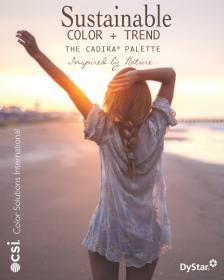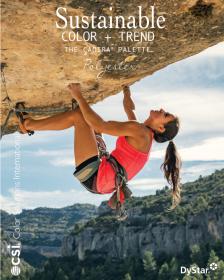Huntsman Textile Effects introduces UNIVADINE® E3-3D
- Huntsman Textile effects redefines dyeing of polyester including microfiber and blends with UNIVADINE® E3-3D diffusion accelerant
- Eco-friendly diffusion accelerant provides reproducible, high-speed polyester dyeing
Singapore – Huntsman Textile Effects introduces UNIVADINE® E3-3D next-generation diffusion accelerant to help mills achieve high-performance dyeing of polyester, microfibers and blends in an environment-friendly way that complies with current and anticipated industry sustainability standards.
The demand for polyester and man-made fibers is booming as sports and athleisure apparel markets expand rapidly around the world. At the same time, big-name brands that set trends in the sector continue to increase focus on sustainability and performance. As such, this is putting pressure on mills since the current industry standard involves chemically active diffusion accelerants that contain unwanted chemicals and require additional leveling agents and anti-foaming products that may be hazardous to people and the environment.
Developed by Huntsman Textile Effects specifically to meet these challenges, UNIVADINE® E3-3D diffusion accelerant is low-odor, free of benzyl benzoate and other hazardous substances. Part of Huntsman’s range of innovative dyEvolution™ dyeing auxiliaries, it uses Huntsman’s Active Diffusion Technology to enable high-speed dyeing with best-in-class leveling, retarding and migration properties.
“UNIVADINE® E3-3D diffusion accelerant delivers across three key dimensions – diffusion, leveling and migration – for exceptional performance and environmental and economic sustainability. Its environmental credentials offer mills greater processing flexibility and an optimum price-performance ratio,” said Kerim Oner, Global Marketing Manager for Dyeing Auxiliaries at Huntsman Textile Effects. “We expect this latest offering to change the way that the industry dyes polyester and blends while meeting stringent environmental standards.”
UNIVADINE® E3-3D diffusion accelerant has a high affinity to polyester, causing the fiber to swell and increasing the diffusion of the disperse dye, even at lower temperatures. Multiple leveling mechanisms then slow down the exhaustion rate to ensure safe, defect-free dyeing. Finally, as the dye bath heats up, the product’s strong support for disperse dye migration ensures the dye molecules are evenly absorbed.
As a result of this cutting-edge diffusion technology, UNIVADINE® E3-3D diffusion accelerant can be used to successfully dye polyester fibers in tightly wound or high-density yarn/beam dyeing and is suitable for jet applications without the need for anti-foaming products. Reducing exposure to high heat, its Active Diffusion Technology minimizes the potential to damage the elastane in polyester-elastane blends and provides for on-tone dyeing of microfibers. The superior migration support of UNIVADINE® E3-3D diffusion accelerant also increases reproducibility, allowing mills to dispense with additional leveling agents. Polyester, microfibers and blends treated with UNIVADINE® E3-3D diffusion accelerant comply with the requirements of bluesign®, in addition to being suitable for Standard 100 by OEKO-TEX® and an approved input dyeing auxiliary chemical for GOTS (Global Organic Textile Standard) certified textile products*.
Huntsman Textile Effects









